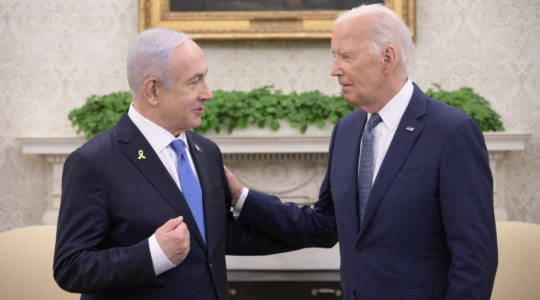JERUSALEM (JTA) – By all accounts, Prime Minister Ehud Olmert should have been history.The Winograd Commission’s interim report issued April 30 on the conduct of last summer’s second Lebanon War could not have been more scathing. The paragraph on the prime minister’s responsibility for the failures and shortcomings in top level decision-making speaks for itself.”The prime minister,” it says, “made up his mind [to go to war] hastily, despite the fact that no detailed military plan was submitted to him and without asking for one.”Further, “His decision was made without close study of the complex features of the Lebanon front and of the military, political and diplomatic options available to Israel.”And, “He made his decision without systematic consultation despite not having experience in foreign and military affairs.”Ostensibly the damning report should have been just the stick Foreign Minister Tzipi Livni needed to unseat Olmert. For months Livni had been crafting a move to take over as Kadima Party boss and prime minister. Her assumption was that a critical assessment of Olmert’s conduct of the war coupled with his close to zero popularity ratings would force him to step down.Kadima lawmakers, she thought, would not tolerate an increasingly unelectable leader who could cost them their parliamentary seats.In the weeks leading up to the report, Livni’s close ally, party Knesset whip Avigdor Yitzhaki, openly approached potential Kadima rebels trying to build a pro-Livni camp ready to move at the right time. The influential internal security minister, Avi Dichter, was supposed to join at a crucial juncture to create a critical mass against Olmert.But there was one thing the would-be rebels had not counted on: the power of incumbency.As soon as the Winograd report was published, Olmert and his aides used threats and promises to derail the planned “coup.” Some potential rebels were offered important new posts that would open up with a planned government reshuffle; others were threatened with a premature end to their political careers.All were warned that a move against Olmert would spark new elections Kadima would lose.Less than 48 hours after the report was published, Livni’s coup attempt had been stifled.Still, Olmert remains vulnerable. There are three ways he could lose his hold on power: If he fails to keep control of Kadima, if he loses his Knesset majority or if mounting public pressure on him to resign becomes intolerable.For now his hold on Kadima seems secure, but there are rumblings in the party about replacing him with former Prime Minister Shimon Peres rather than Livni. The idea is that Peres would be a caretaker prime minister until Kadima chooses a new leader. That would give some of Livni’s rivals for the top spot – Housing Minister Meir Sheetrit, Transportation Minister Shaul Mofaz and Dichter – time to organize leadership bids.Olmert, however, is moving swiftly to head off the Peres push the same way he quashed Livni’s attempt.To keep his Knesset majority, Olmert has been strengthening ties with his junior coalition partners and wooing the fervently Orthodox United Torah Judaism party. He has developed particularly good relations with Yisrael Beiteinu’s Avigdor Lieberman and Shas leader Eli Yishai.With them and the Pensioners’ Party he has a base of 59 seats in the 120-member Knesset, and together with Labor a solid majority of 78. The weak link is Labor, which is under mounting pressure to pull out over Winograd. Hence Olmert’s effort to bring in the six-member UTJ faction, which would leave him with a majority of 65 even if Labor bolts.To ease public disaffection, Olmert intends to come out with a new peace initiative, his confidants acknowledge. This would coincide with another major element of his survival strategy: the establishment of a second Olmert administration in June, after Labor elects a new leader.The aim would be to regain public confidence by appointing strong ministers to the key defense, finance and foreign affairs portfolios, and pressing a peacemaking agenda.Again, the problem with this plan is Labor. Party secretary Eitan Cabel and leadership candidates Ophir Pines-Paz, Ami Ayalon and Dani Yatom are calling for Labor’s peremptory withdrawal from the government if Olmert continues to head it.Labor’s dilemma, however, is far from simple. Pulling out of the Olmert government could spark early elections that right-wing Likud leader Benjamin Netanyahu would probably win.On the other hand, if Labor stays in the coalition, its new leader, probably Ayalon or former Prime Minister Ehud Barak, would likely become defense minister in Olmert’s “second administration,” a good base from which to build a future campaign for prime minister against a weak incumbent.Netanyahu is biding his time, waiting for public pressure to force an election. He had toyed with the idea of generating a motion of “constructive no-confidence,” in which 61 Knesset members would back him for prime minister, enabling him to form a government without having to go to the polls. But he dropped the plan when finding those 61 votes proved more difficult than he anticipated, and when close confidants pointed out that he stood to gain far more via the landslide election victory public opinion polls are predicting.The Likud’s tactics will be to maintain the anti-Olmert pressure generated by the mass rally it helped organize in Tel Aviv on May 3. An estimated 150,000 people from the left and the right filled Rabin Square in a rare bipartisan demonstration demanding that Olmert go.Olmert is facing other obstacles, too. In the coming weeks the commission will release his testimony. If it transpires that he tried to shift blame to his predecessor – Kadima founder Ariel Sharon – he could find himself in serious trouble inside the party.For now the focus is on the commission’s specific criticisms of the prime minister: the hasty decision to go to war; the loose definition of war aims; the failure to adapt to emerging conditions. This pits the strong public desire for change against the power of incumbency in an as yet unresolved battle.But the findings of the Winograd Commission raise far deeper questions about Israel’s leadership and future. Foremost among them: Is the country capable at this critical time of producing a leadership proficient and strong enough to fight another war if need be, or steer the country toward peace with its neighbors if and when the opportunity presents itself?This, more than Ehud Olmert or Tzipi Livni’s political future, is the deeply disturbing question the Winograd Commission poses.

Help ensure Jewish news remains accessible to all. Your donation to the Jewish Telegraphic Agency powers the trusted journalism that has connected Jewish communities worldwide for more than 100 years. With your help, JTA can continue to deliver vital news and insights. Donate today.





